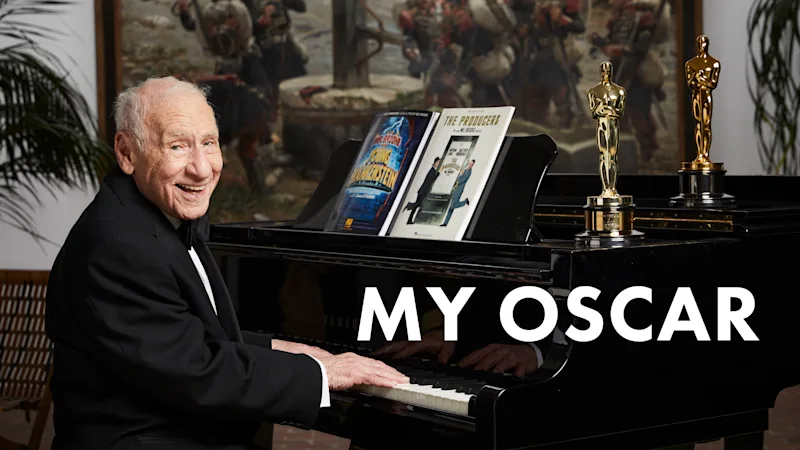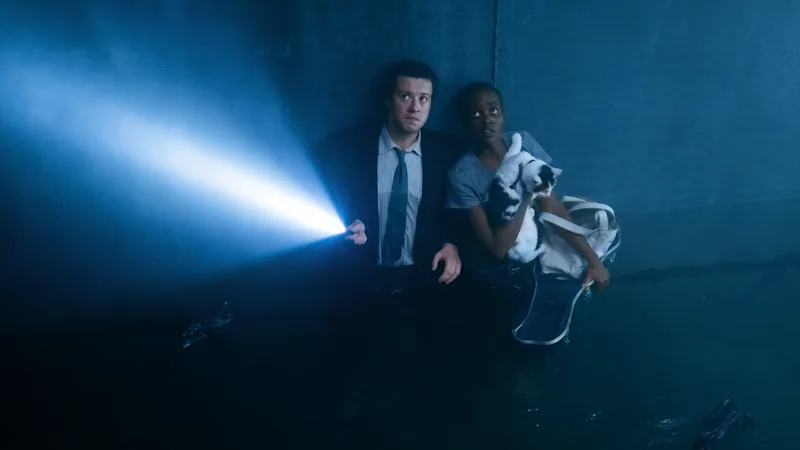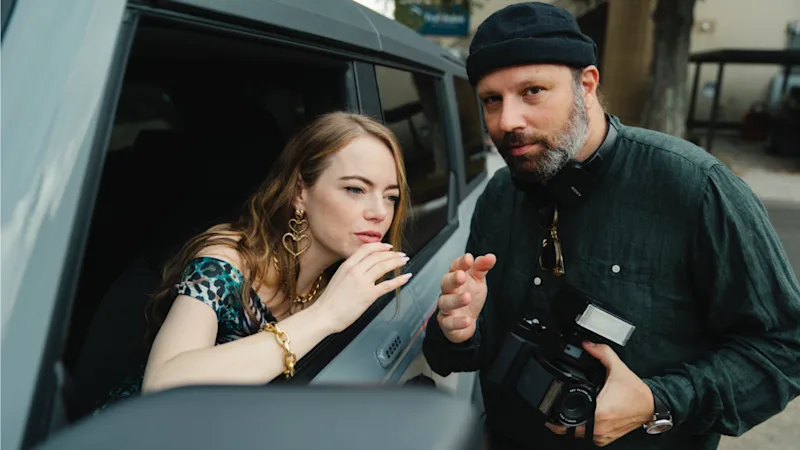Martin McDonagh remembers how scared he was when he won his Oscar. Born in London to Irish folks, the playwright-turned-filmmaker made his directorial debut with 2004's Six Shooter, a 27-minute-long dark comedy starring Brendan Gleeson that he shot on location in Ireland. With it, McDonagh won the Oscar for Best Live Action Short Film.
"I remember just being terrified at the chance of winning," he remembers. "And being terrified getting up on stage, and then being so relieved afterwards. Five minutes after winning is the best time in the world. During the bit it's kind of horrible, but in a good way. But five minutes after you've got it in your hand and it's just cool. It's weird, but it's cool."
For his first feature, 2008's In Bruges, McDonagh cast Gleeson and Colin Farrell as Irish hitmen hiding out in Belgium after a contract killing gone wrong, and earned his second Oscar nomination (for Best Original Screenplay). "I've been back and lost and it's not so bad at all," McDonagh says with a chuckle, "because it means you don't have to go through the fear thing."
He would return to the Oscars yet again with 2017's searing crime drama, Three Billboards Outside Ebbing, Missouri, which received seven total nominations — including nominations for McDonagh for Best Picture and Best Original Screenplay — and won Oscars for Frances McDormand (Best Actress) and Sam Rockwell (Best Supporting Actor).
McDonagh's latest offering is The Banshees of Inisherin, which he initially conceived as the final part of a trilogy of darkly comedic plays encompassing The Cripple of Inishmaan (1996) and the Laurence Olivier Award-winning The Lieutenant of Inishmore (2001). The play never came to be, but he pocketed the title. Now a film, The Banshees of Inisherin feels like a return to McDonagh's roots: It's his first film since Six Shooter to be set in Ireland, filmed on the Aran Islands off the coast of Galway, and reunites Farrell and Gleeson. Set in 1923, as the Irish Civil War rages on in the mainland, Pádraic (Farrell) wakes up one day to discover his best friend and faithful drinking buddy, Colm (Gleeson), no longer wants to be friends with him. Colm's reason: "I just don't like you no more."
In conversation with A.frame, McDonagh discusses the process of reclaiming The Banshees of Inisherin, getting the In Bruges gang back together, and why he's no longer interested in making "cool films."
MORE: Colin Farrell and Brendan Gleeson Reunite in 'The Banshees of Inisherin' Trailer
A.frame: Is this something you had been germinating on and hoping to tackle right after Three Billboards? Or did it come to you after all was said and done with that film and you were looking ahead to what to make next?
It's much more recent than that, really. There was a version of it that I wrote maybe seven years ago, but it was crap. And I completely threw it out in my mind and didn't think about it until I reread it three years ago, and the first five pages weren't crap. The first five pages were the exact same first five pages of this movie, up to the initial break-up idea. But I thought, 'Well, let's just be true to that,' because the original had plot and plot and plot, and the sadness of the story wasn't there outside of those first five pages. I thought, 'Why don't we just stick to the horrible sadness of a break-up story and have it be all about that?'
How do you ultimately know if something is actually crap that isn't worth pursuing any further, or if there is a kernel there that is worth pursuing?
The facetious answer would be my girlfriend [Phoebe Waller-Bridge] tells me. But the real answer is you just know in your bones when it's a good one as soon as you put the pen down. Well, maybe not as soon as you put the pen down, but like a month afterwards, if you're still thinking about it and you still are affectionate towards it, you know if you've got a good one. It's all very instinctive and instinctual, but you kind of know. In Bruges, the making of it and what it became, it's great when something becomes even greater than its constituent parts, and In Bruges was definitely that. But I still liked the script of In Bruges a lot. I guess the trick is to make sure you don't do any of the dud scripts, and leaving big gaps between projects as I do, I think that gives you more time to both pick and choose the good ones and write a new one if the previous one wasn't good enough.
After Three Billboards was such a success, what was it that drew you to Banshees?
Definitely getting Colin and Brendan back together, and doing a very simple, sad story without fireworks or explosions or gunfights or any of that stuff. To keep in the same territory as Billboards and In Bruges, I think, not to go down the Seven Psychopaths direction. I don't want to make cool films anymore. I used to think I did, and I think In Bruges seems like a cool film, but it's actually quite melancholy and sad in a lot of ways too. I think that's what Billboards had, and I can see the through line. I'm going to try and continue that, and it's definitely true of Banshees. It's not cool, but hopefully it's still enjoyable.

Writing a script specifically for Brendan and Colin, is that something you're upfront about when you send it to them? 'If you say no or can't do this, it messes up my vision'?
It's not quite that kind of pressure. [Laughs] I mean, they know it's for them. If they said no to this, I don't know if I would've made it with anyone else anyway. In fact, I sent them the original — the version like seven years ago — and they kind of said yes to it, but we all knew it wasn't quite good enough. So, we kind of let it quietly go by the wayside. Literally, I didn't even think about it. But then, I got this new idea for it, and I knew it had to be them. And they're smart guys. They could see it was pretty good too. So, there's never pressure between us all. If I ever send something to them and they don't want to do it, we've always spoken and had an understanding that there will never be any pressure. Just as if they ever came to me with some kind of project, I should have no pressure about having to do it just because we're friends. It's always based on the work and the love of the work.
If they read both the 'crap version' and then this version, what were their reactions when they saw the evolution?
They were pretty pleased, I think, because the other version had plot and extra characters that had nothing to do with the sadness of this break-up. This new version was meaty and all about them and really mined the depth of the sorrow and the humor of this central story. So, they're not fools. They could definitely see, even just character-wise, there was a lot more to get their teeth into.
You didn't cast Brendan and Colin again wanting the same performances you got in In Bruges. How did you feel like these characters would reveal new sides of them or challenge them as actors?
I guess I didn't know. I just know how good they are as actors. I've grown to leave a bit more room in the spaces between the lines in the script, and definitely, we had two weeks rehearsal for this one as we did on In Bruges, and it's during that time that we discover where the more important places are that aren't on the page. Even in terms of, which scene is going to be sadder than another? Which reaction is going to be most important to me? Oftentimes, I write a pause into a script, but the rehearsal process is really evaluating what is going on in that moment. Is it agreement of what went before? Is it deep pain or sorrow or blankness, or whatever else? And leaving room for them is a big part of the process that I've learned.
This movie is so rooted in these conversations and in a very specific back and forth. How sacred is the text then for you? Is it word specific or do you allow room for improv on set? Is that all discussed and sorted out during that rehearsal period?
It's completely word specific. I don't really allow for any improvisation at all. Sometimes, like on Three Billboards, Sam Rockwell would improv the bits just before a take, what was going on in the room just before that, and interestingly, some of that stuff is so good that it stays in the movie. But in terms of changing the script, I don't really see the rehearsal process being about that at all. It's about discussing why every line and why every word is there and for me to explain all that. Sometimes lines are then lost or shaken up a little bit, but I've usually done the spadework, the donkey work for a year before the film gets made. It's not like I've written it two weeks before and it's a document to be discussed. If I set it in stone, it would make it sound like it's a straightjacket. But I think good actors know and like good lines and trying to find the best way to say that line, rather than trying to change it for whatever idea of the line that they have.

Was there a choice Colin or Brendan made in how they played these roles or something they brought to one of those moments in between the lines that surprised even you?
Always. Even as I say these things are set in stone dialogue-wise, everything else, every intonation and every different line reading, is theirs. Part of the rehearsal process is for them to bring every idea that they've got. For instance, with Brendan, is the character actually this harsh or is he faking the harshness to get it through to Colin that this has to happen? That was part of our discussion and part of what Brendan brought to it, is that even when he is being harsh, on his face we can see that he doesn't want to go there. He doesn't want to be that tough, but he has to get it through to Colin.
Colin, calling it a surprise is weird because I knew he would bring this sensitivity and the decency that he has as a man to the part. I don't think anyone can convey the sadness that Colin can. Both in In Bruges and in this, the sadness and the pain in his eyes is palpable throughout. So, I was overjoyed to see it, but to say it was a surprise, it's probably not true because I knew he was going to be so good.
With Banshees, was there something you'd never gotten to do on a film that you got to do here? Or something that you knew would challenge you as a filmmaker?
I got to hang out with a miniature donkey. That was something I've always wanted to do. [Laughs] Weirdly, it was probably being quiet. Doing a quiet film, and not worrying about showy visuals. Trying to leave room to capture the beauty of Ireland, and to make sure that the second unit DP had a lot of free time and a lot of film to explore landscape and animals and all of those things. I think that was the new part of this one. I always tried to do that in the others, but there are whole periods in this one where it's just quiet and we see the island and the sadness can kind of spread, or almost be tempered by the beauty of the place.
Jenny the Donkey is one of my favorite film characters of the year. In earnestness, she is introduced and your reaction is, 'Oh, how adorable,' and then, where her arc goes, there is true gravitas there.
It shouldn't work, but it does seem to. It's a hard one to talk about without spoilers, of course, but I do love Jenny, maybe more than you. [Laughs] Back off, she's mine!
By John Boone
RELATED CONTENT:
Here Are the 2022 Venice Film Festival Winners
'Till' Director Chinonye Chukwu on the Importance of Stopping Everything for a Hug (Exclusive)
With 'Blonde,' Director Andrew Dominik Finally Stopped Being Afraid of Failure (Exclusive)







